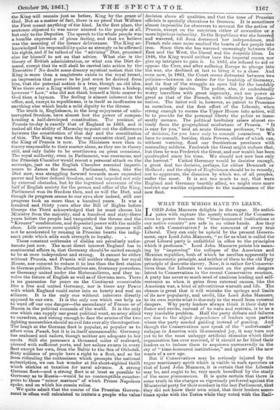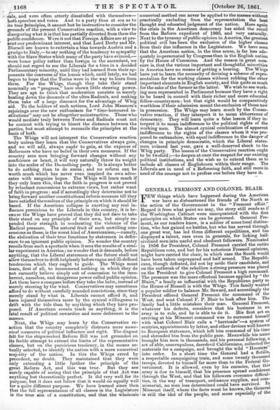WHAT THE WHIGS HAVE TO LEARN. . L ORD John Manners delights
in the vague. He antici- pates with rapture the speedy return of the Conserva- tives to power because the "time-honoured institutions or our'native country" are safe in no other hands. Are they safe with Conservatives ? is the comment of every true Liberal. They can only be upheld by the present Govern- ment, says Lord John Manners, " so far as what is called the great Liberal party is unfaithful in office to the principles which it professes." Lord John Manners points his mean- ins. by "improving" the collapse of the American and Mexican republics, both of which he ascribes apparently to the democratic principle, and neither of them to the old Tory principle of domestic slavery. Now, it is rather for Conserva- tives than for Liberals to comment on the great dangers latent to Conservatism in the recent Conservative reaction. A party has never so much need of cautious leading and self- restraint as when it gains from external causes, like the American war, a kind of adventitious warmth and life. The chance is great that it will mistake the springs and limits of its new popularity, and credit, like Lord John Manners, to its own merits what is due only to the recoil from external dangers. Why party leaders always think it their duty to foster and excite, instead of to warn and restrain, is to us a very insoluble problem. Half the party defeats and failures are due to the abject dependence of leaders upon parties where the party needed guiding instead of goading. And though the Conservatives now speak of the " unfortunate" collapse in America with ill-concealed joy, it may turn out yet to be the most unhappy artificial stimulus which their organization has ever received, if it should so far blind their leaders as to induce them to acquiesce unreservedly in the cry of " time-honoured institutions," and ignore all the new wants of a new age. But if Conservatives may be seriously injured by the vague reactionary spirit which is visible in such speeches as that of Lord John Manners, it is certain that the Liberals may be, and ought to be, very much benefited by the study of the same phenomenon. It is quite certain that there is some truth in the charges so vigorously preferred against the Ministerial party for their conduct in the last Parliament, that they did not know their own mind, that their leaders some- times spoke with the Tories while they voted with the Roil- :ads, and were often utterly dissatisfied with themselves— both speeches 'and votes. And to a party thus at sea as to its true principles, it cannot but be instructive to consider the grounds of the present Conservative reaction, with a view to discoyering what it is that has partially diverted from them the public confidence. Were it not that Foreign Affairs are at pre- sent our predominant interest, and that Lord Derby and Mr. Disraeli are known to entertain a bias towards Austria and a grudge to Italy,—to say nothing of the tendency to sympathy with the Slave States which many of the party have evinced,— were home policy rather than foreign in the ascendant, we should not regret to see the Liberals for a time in a decided Parliamentary minority, until they had learned from their op- ponents the converse of the lesson which, until lately, we had begun to hope that the Tories were in the way to learn from them. For the Whigs, though they take their stand nominally on " progress," have shown little steering power. They are apt to think that moderation consists in merely beating down the demands of the ultra-Radicals, and making them take off a large discount for the advantage of Whig aid. To the holders of such notions, Lord John Manners's rejoicings over the new enthusiasm for " time-honoured in- stitutions" may not be altogether uninstructive. Those who would mediate truly between Tories and Radicals must not be content with trying to bisect the distance between the parties, but must attempt to reconcile the principles at the basis of both.
The Whigs will not interpret the Conservative reaction truly unless they learn that the Conservatives always gain, and we will add, always ought to gain, at the expense of Reformers who have no belief in their own measures. If the country sees men bringing forward changes without any confidence or heart, it will very naturally throw its weight into the scales of the Do-nothing party. It is always better to do nothing than to do amiss ; and no reform can be worth much which has never even inspired its own advo- cates with sanguine hopes. The Whigs will learn much if they only learn this, that the faith in progress is not proved by reluctant concessions to extreme views, but rather want of faith in progress : and if accordingly they determine not to bring forward another constitutional reform measure till they have satisfied themselves of the principle on which it should be based. If the American collapse is exerting any real in- fluence pernicious to the Liberals in this country, it is be- cause the Whigs have proved that they did not dare to take their stand on any principle of their own, but simply ex- pended their strength in moderating the violence of the Radical pressure. The natural fruit of such unwilling con- cessions as these, is the worst kind of Americanism,—namely, the abdication of their true functions by statesmen in defer- ence to an ignorant public opinion. No wonder the country recoils from such a spectacle when it sees the results of a simi- lar experiment in America; no wonder that it demands, before anything, that the Liberal statesmen of the future shall not allow themselves to drift helplessly beforevague and ill-defined tendencies which they ought to guide. The Whigs must learn, first of all, to recommend nothing in which they do not earnestly believe simply out of concession to the inco- herent, nameless, and dangerous power called public opinion. Let them have a compass before they take the helm, instead of merely steering by the wind. Conservatives may sometimes afford to do without carefully sounded convictions, since they merely stand by what is. Liberals cannot afford it, and have injured themselves more by the cynical willingness to drift with the tide than by anything which they have pro- posed. If American events teach us anything, it is the fatal result of political cowardice and mere deference to the masses.
Next, the Whigs may learn by the Conservative re- action that the country completely distrusts mere nume- rical measures of political influence and right. The disgust felt for the shipwrecked Reform Bill was not grounded on its feeble attempt to extend the limits of the representative classes, but on the pernicious tendency, in the means ac- tually selected, to identify the nation with a mere numerical majority of the nation. In this the Whigs erred by precedent, no doubt. They maintained that they were only extending a little further the principle of the great Reform Act, and this was true. But they are surely capable of seeing that the principle of that Act was anything but theoretically perfect. It did very well for its purpose, but it does not follow that it would do equally well tor a quite different purpose. We have learned since then that the full representation of all classes in the Legislature is the true aim of a constitution, and that the wholesale numerical method can never be applied to the masses without practically excluding from the representation the best thought and educated judgment of the nation. Here again the crisis in the American democracy has aided the recoil from the Reform expedient of 1860, and very naturally. Next to the tyranny of public opinion in America, the greatest political evil has been the exclusion of the higher classes from their due influence in the Legislature. We have seen that the American nation, in the true sense, is far leas ade- quately impersonated by Congress than is the English nation by the House of Commons. And the reason in great mea- sure is, that the various important and thoughtful minorities in America have no means of getting a hearing. The Whigs have yet to learn the necessity of devising a scheme of repre- sentation for the working classes without robbing the other important elements in English society, and this quite as much for the sake of the former as the latter. We wish to see work- ing men represented in Parliament because they have a right to be heard in council with their richer and more educated fellow-countrymen: but that right would be comparatively worthless if their admission meant the exclusion of those now in possession. The Whigs may learn much by the Conser- vative reaction, if they interpret it to mean abhorrence of democracy. They will learn quite a false lesson if they in- terpret it to mean indifference to the political rights of the working men. The almost cynical combination of apparent indifference to the rights of the classes whom it was pro- posed to enfranchise, with equal indifference to the danger of changes in principle democratic, which the Liberal states- men evinced last year, gave a well-deserved shock to the Whig party. The lesson of the Conservative reaction ought to be twofold ;—to deepen at once the respect for our existing political institutions, and the wish so to extend them as to include all classes of Englishmen within their range. The Liberals are in need of a Reforming faith, and still more in need of the courage not to profess one before they have it..































 Previous page
Previous page